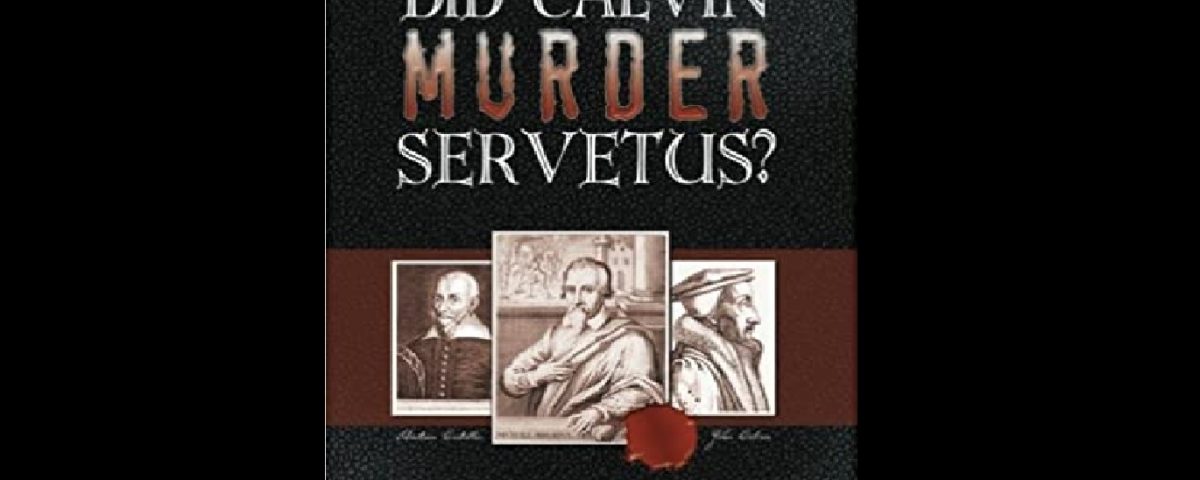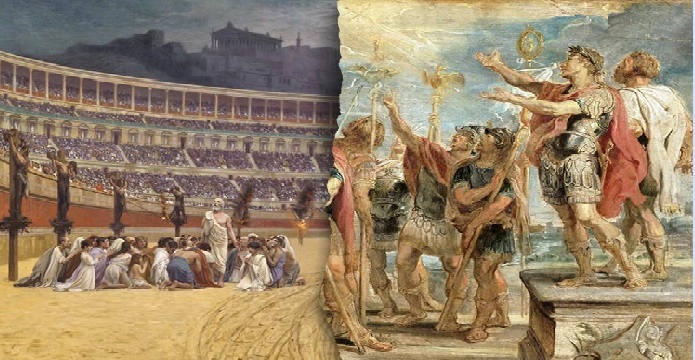From Rives, Did Calvin Murder Servetus?
In 1559, Calvin needed to rationalize the killing of Servetus to his core followers. The ghost of Servetus continued to haunt Calvin because Calvin’s own words as a young Christian were likewise haunting himself. In Calvin’s first edition of the Institutes (1536), Calvin wrote:
It is criminal to put heretics to death. To make an end of them by fire and sword is opposed to every principle of humanity.[1]
“Indeed, just before he died, Calvin taught in his commentary on Ezekiel 18:34 that anyone like himself who had been regenerated can be an unrepentant murderer and still can expect eternal life, contrary to what Apostle John taught.”[2]
Obviously, Calvin’s doctrine after the killing of Servetus was shaped by his need to justify his role in the killing of Servetus. We would expect Caiaphas to do likewise so as not to lose face for having Jesus killed as an alleged blasphemer. Hence, Calvin’s doctrine is often dictated by Calvin’s policy of protecting himself rather than providing true doctrine. Unless you know Calvin’s true responsibility in the Servetus Affair, you will never anticipate the need to read Calvin with skepticism.
Moreover, and importantly, the Servetus Affair was the direct result of the license provided by Calvin’s religious doctrine. It allowed him to harbor for a very long time a personal animosity against Servetus, never realizing the spiritual danger to himself for hating another human being.
Calvin knew Servetus since college days in 1534. In approximately that year, they mutually planned a public debate which was cancelled. They corresponded numerous times until their correspondence ceased in 1543. Then in 1546, Calvin put in writing to Farel that Calvin would not let Servetus leave Geneva alive if Servetus should set foot in it. Calvin repeated such an intent in writing during the Servetus trial of 1553.
How was this desire to kill someone over differences of opinion justified in Calvin’s thinking as of 1546? This is difficult to explain because it was in this time period that Calvin adamantly insisted heretics were not to be killed instead must be corrected only by doctrine. Thus, how did Calvin rationalize his desire to kill Servetus in this period of time when he espoused tolerance toward heretics?
There is a conceivable explanation: Calvin’s doctrine on evil effectively erases the moral barrier to commission of evil, whether this doctrine was consciously or unconsciously designed to do so.
Right up to that time and throughout all his life, Calvin espoused a doctrine that shifted the responsibility of evil in man to God’s predetermined will. Calvin insisted that man has no free will even to resist doing evil. Calvin declared that God directs all the evil we do, even though Calvin affixed the refrain ‘yet God remains above every taint’ to this peculiar view of God’s sovereignty.
Calvin needed this obviously troublesome doctrine to support Calvin‘s pet doctrine of predestination of the lost. Calvin had to explain how God could deprive the lost of any opportunity ever to believe and still be a lovable God. Calvin found a way.
Calvin felt he could attribute this immoral act to God (I.e., depriving the lost of any ability to be saved) because Calvin taught God wills all immoral acts anyway—both the evil thoughts and evil deed. What of our revulsion at such a horrible idea about God? Calvin said not to worry, because he added the refrain “that God remains above every taint.”
However, that refrain was no answer to the problem. It was just an ad hoc statement designed to deflect attention from the ethical problem posed by Calvin‘s doctrine on God‘s sovereignty.
Calvin should have instead reconsidered the entire doctrine of predestination before taking this detour. He should have realized that he developed this doctrine when he was only a Christian of one year’s duration. Everyone would have accepted a modification to remove this evidently deplorable doctrine. Unfortunately, no experience nor criticism ever dislodged Calvin from this bizarre claim that he first uttered in 1536 in his Institutes.
When we then cast our eyes at the killing of Servetus, we can legitimately ask this question: What would one expect from a theologian who saturates his mind with the belief that God directs all murderers’ thoughts and God makes murderers in fact murder (although supposedly ‘God remains above every taint’ despite doing so)?
The answer is obvious: with Calvin‘s bizarre idea, one can license himself murdering another because it is God’s will and direction even as you do so. Then, if you are in God and God‘s spirit is in you, then you can freely murder, and still enjoy Christ’s covering because God directed the evil and he was beyond any taint. His glory covers your murder.
This doctrine of God’s role in evil will similarly become the hole in anyone’s conscience who believes it.
Hence, one cannot ignore that key tenets within Calvinism could obviously be used to rationalize a most egregious crime even in a conscience that supposedly loved God. Whether purposefully designed from the beginning this way or not, these key tenets gave Calvinism its ultimate shape.
Calvin delivered a deformed version of Christianity.
This is extremely relevant today. This is because the Westminster Confession perpetuates Calvin’s doctrine about God’s responsibility for evil through weekly Bible studies in hundreds of churches. It is a doctrine, if truly harbored and relied upon, can corrupt the soul, as Lutherans, Baptists and Evangelicals have consistently tried to warn Calvinist for the past for centuries.
Introducing a non-believer to Christ through Calvin is thus fraught with problems. Calvin is a negative stain on Christianity despite all the relevant and even accurate statements in his commentaries. Calvin, frankly, is an embarrassment to the faith. That many Christians call themselves Calvinist merely compounds the problem.
[1] Stefan Zweig, The Right to Heresy, 1936, p 179 (quoted by Casteliio in 1554).
[2] See “Calvin’s Comment on Ezekiel 18:24 Says An Unrepentant Murderer is Still Saved”




